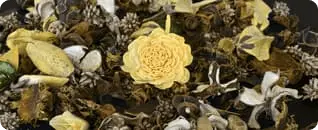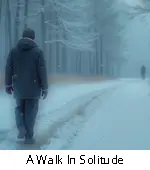
A Walk In Solitude
I strolled a path in solitude
As snow and frosty winds renewed.
The night was giving way to light
When I beheld a startling sight:
There was a figure up ahead
Whose twisted shape invited dread.
Its form was cloaked in falling snow,
Which by that time began to slow,
But not enough to clear the view,
So I then called a name I knew.
Perhaps the figure knew me too,
Yet only fear within me grew.
So who was here with me today?
And who had crossed my path this day?
I paused right there to look around
And search for steps upon the ground.
The snow remained devoid of prints;
I roved my eyes for other hints.
With squinting eyes, I braved a gaze
And uttered words infused with praise.
I slowly walked toward the sprite
As sunlight chased away the night.
I was relieved to clearly see
That what I'd feared was just a tree.
I wrote this narrative poem as a metaphor for the frequently misguided interpretations of one's feelings, highlighting the tendency to project emotions and fears onto ambiguous figures in our lives, which are often unfounded.
Image by ALV - AI generated
Poetic form: Couplet
© 2025, Angel L. Villanueva. All rights reserved.

Beware The Selfish
On social media's maiden flight,
A boastful group arose.
They hid their real lives from sight
While seeking 'likes' for their delight.
They flaunted "wealth" and gaudy clothes,
Inviting posts of prose.
This selfish group is unrefined
And lacking in appeal.
They wear a mask to hide behind,
Insisting that their deeds are kind,
But time will force them to reveal
The way they truly feel.
With unctuous lips, they will define
The works they leave behind.
But don't imbibe their rancid wine
Or dwell on all that they opine.
Their copious words are ill-defined,
Designed to sway your mind.
You would do well to not engage
This narcissistic crowd.
Their thorny thoughts of latent rage
Are deftly aimed to subtly wage
A war of words that rises loud,
Like thunder from a cloud.
The modern proliferation of social media has exposed the spectrum of narcissistic traits many individuals possess: an excessive preoccupation with themselves, a display of a profound sense of superiority, and a constant need for admiration and validation. They also tend to lack empathy for others and exhibit manipulative, arrogant, and entitled behavior. With this poem, I aim to capture some of those traits.
Image by Tamara Gak via Unsplash
Poetic form: Sexain
© 2025, Angel L. Villanueva. All rights reserved.
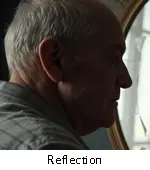
Reflection
The aged man observes the child,
Whose gaze he meets not far from him.
A cherub's smile adorns his face
Beneath a light that has grown dim.
The child is blind to the tests of life,
Too young to fully understand.
He seems content with life for now,
And play is all that he has planned.
The aged man would like to speak
And share his wisdom with the child—
To be the one who guides his steps
And shields him from the days defiled.
He knows the pits that lie ahead
And all the aches that he will face.
He wants to warn the blameless child
To wisely choose the dreams he’ll chase.
He would reveal which friends to shun
And who among them he should keep.
He'd mention days of boundless love
And tell of times when he would weep.
He wants to be his guiding hand,
To offer wisdom gained with age.
He'd set his path toward the road
That leads to joy and not to rage.
They share a sad, discerning gaze,
For they can see it is too late.
They know that time has passed them by,
And mirrors can't undo their fate.
Reflecting an uneasy smile,
They stretch their hands; their fingers graze.
The aged man then turns around
And leaves behind his shattered days.
This narrative poem captures the reflections of an old man as he gazes into a shattered mirror while contemplating his life. It explores the connection between the wisdom that comes with age and the innocence of childhood. With it, I wanted to convey the longing we sometimes have to impart life lessons to our younger selves.
Image by ALV - AI generated
Poetic form: Quatrain
© 2025, Angel L. Villanueva. All rights reserved.
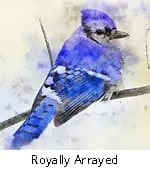
Royally Arrayed
I am the sky on autumn days;
The oceans that are seen from space.
I am a peacock's regal plumes;
A singing jay with wings of grace.
I am the hue in many eyes;
A mountain swallowtail in flight.
I am a flame within a fire;
A morning glory bathed in light.
I am the tinge of Neptune's tone;
A gentian flower's summer glow.
I am a topaz mined from rocks;
The fragile shell where robins grow.
I am a gift God gave to man;
Hibiscus drenched in morning dew.
I am the whale that swims the seas;
I am the color known as blue.
Image by ArtTower via Pixabay
Poetic form: Quatrain
© 2024, Angel L. Villanueva. All rights reserved.
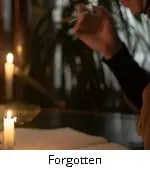
Forgotten
I've read the wizened words inscribed with pens
That wistful poets paint with latent eyes.
Their pains, abandoned dreams, and faithless friends
Are voiced in lines of verse that some despise.
They drown in sorrow dancing in their minds,
For they can see the tears within their words.
They sing exquisite lines of varied kinds,
Much like the songs of captured mourning birds.
Oh, pleasant are their words when I despair,
When soothing solace draws away from me.
Their tears are like a balm applied with care,
Which soothes a captive heart and sets it free.
Their choral words may see a thousand years,
Forgotten then will be the poet's tears.
Image by cottonbro studio via Pexels
Poetic form: Sonnet
© 2023, Angel L. Villanueva. All rights reserved.

The Sun In Me
I find myself traversing sand,
Where scorpions roam the heated land
And clouds hold back from setting free
A drop to quench the sun in me.
From high above, the daylight star
Has dried the waters near and far.
My lips are parched; I beg to see
A drop to quench the sun in me.
A camel stares as I inch by
On blistered knees that beg to die,
While heaven sends toward the sea
A drop to quench the sun in me.
The dawn supplants the fleeing night,
And I escape toward the light.
When I awaken, I can see
The drop to quench the sun in me.
This whimsical take on waking up thirsty is also an expression of appreciation for the wonderful gift of water.
Image by Pexels via Pixabay
Poetic form: Quatrain - Kyrielle
© 2022, Angel L. Villanueva. All rights reserved.

Valiant Men
The sailors brave the angry storm
As waves the ocean brings.
It seems they've seen one hundred years
Of fighting death despite their fears,
Like ancient warring kings.
The frigid water stings their hands
And chills their sodden skin.
But they confront the ghastly howls
And fight with death as thunder growls
To reach their land and kin.
The valiant men unite as one
And bravely surge ahead.
No wave or grave their will can break
Nor dim the morning light to wake;
They fight for life instead.
But there, behind a swelling wave,
A larger one they see.
And so they pray their ship holds out
As they again attempt to rout
A sanguinary sea.
This poem was inspired by stories I've read about the courage and bravery displayed by sailors who have faced a storm in the open sea.
Image is in the Public Domain
Poetic form: Quintain
© 2022, Angel L. Villanueva. All rights reserved.

The Price of Foolish Pride
The sands expand before his eyes
And stretch across the earth.
He craves the tears that heaven sends
To save what Hades never lends—
To him a million worth.
With pride, he boasted to the crowd
The day he gave his talk
That strength would surge to let him fly
Above the sands that were so dry
That only Death could walk.
He crawls and hopes the sun will spare
His blistered flesh this day.
Lamenting all that he had vowed
In arrogance to please a crowd,
He bows his head to pray.
But faith was not a strength he knew,
And so his words were bare.
Devoid of hope, he stares ahead
And grasps that soon he will be dead,
Despite his woeful prayer.
He then accepts a destiny
That no one can defy.
So now he waits for Death to care
And save him from a hungry pair
Of vultures circling high.
Pride can have a positive meaning, such as when parents take pleasure in their child's accomplishments or when maintaining a loving and lasting marriage despite difficulties. But excessive pride can lead to arrogance, which can also result in poor decision-making. This thought was the inspiration for the poem.
Hades = the common grave
Image by Pezibear via Pixabay
Poetic form: Quintain
© 2022, Angel L. Villanueva. All rights reserved.

Narcissist
While sitting in a bistro chair
And staring at a window's glare,
You shift your head and flick your hair
At roving eyes that gawk and stare.
You deign to glance beyond your book
To smile at those who pass and look.
But there is one for whom you care,
The girl whose eyes you also share.
With only her, you spare your view,
A mirrored stamp of one like you.
With this poem, I briefly explore a few of the characteristics displayed by a narcissistic individual.
Image by brad-lloyd via Unsplash
Poetic form: Couplet
© 2022, Angel L. Villanueva. All rights reserved.

A Forgotten Joy
He drives in grief to grandma's home,
The place he always loved to roam.
For decades now, he has been gone,
But death has claimed her life at dawn.
When he arrives, a crowd has thronged
To grieve for her, who had belonged.
And then he joins the tears that flow
As he absorbs the heavy blow.
They talk about the times they shared
And how they felt so unprepared.
But now that she has breathed her last,
They look for comfort in the past.
Recalling all his wondrous years,
He steps away from all his peers.
His eyes are drawn to photo frames
That now preserve undying names.
In thought, he walks into her room,
Where he had played in days of bloom.
And there, beside his grandma's bed,
Remained his box of faded red.
He lifts the lid, then reaches in
And finds the boy that he had been.
And now, like then, he hugs the toy
His grandma made to bring him joy.
This poem, written in couplet form, is fictional and not based on personal experience. With it I aim to convey the emotional pain associated with losing a loved one, as well as the comforting role that memories play during times of grief.
Image by PublicDomainPictures via Pixabay
Poetic form: Couplet - Narrative
© 2022, Angel L. Villanueva. All rights reserved.

Again
The bench is near where children play
And where she sits to dream and muse.
She knows her life will shortly fade—
A doleful thought she can't refuse.
Her wrinkled skin declares her age,
And her eyes, alive years ago
When young and lustrous in their shine,
Now seem like dying embers' glow.
Her hair is dull, a tangled gray,
And lifeless in the twilight breeze.
She smiles, recalling years ago
When she could walk with graceful ease.
The countless memories she's stored
Begin to flood her waning mind.
Oh, how she longs for youth once more—
The days when life was fun and kind.
The children's songs and gleeful shrieks
Arrest her ears and misty eyes.
She sees in them the days she lived—
The years she wants to eulogize.
As she observes the children play,
The clouds announce an evening rain.
She faintly smiles, then shuts her eyes
And dreams of being a child again.
There have been times when I've noticed an older woman or man quietly sitting on a park bench watching people pass by, and I've wondered what it is they are thinking. With this poem, I attempt to capture one of those moments. It focuses on the musings of an elderly woman who reminisces about her youth while watching children at play. Doing this evokes feelings of longing in her for the vitality and joy of her earlier years, as well as an awareness of the reality of growing old.
Image by ALV - AI generated
Poetic form: Quatrain - Narrative
© 2021, Angel L. Villanueva. All rights reserved.

The Name We Leave
When we first breathe and start to peer,
What we will be is still unclear.
A book of pages still unturned
Is what we are when we appear.
Whether assigned, purloined, or earned,
And when a standing time has burned,
The name revealed on every page
Will be critiqued, adored, or spurned.
We hope that when we leave the stage,
By early death or withered age,
The reputation left behind
Is one of kindness, not of rage.
Kindness is a trait I admire in others. Individuals who exhibit this trait typically show selflessness and care, qualities that most people find appealing. With this short poem, I reflect on the journey of life and the legacy one leaves behind.
Image by DariuszSankowski via Pixabay
Poetic form: Quatrain - Rubaiyat
© 2021, Angel L. Villanueva. All rights reserved.

These Things
When we obsess on daily needs,
We fail to note the gifts of life.
They fade like flowers swamped by weeds
As we contend with daily strife.
But if we take the time to view
The gifts in things that we forget,
The cares of life will seem quite few;
Our thirst for joy will then be met.
Now note the trees along a lake,
A single cloud that paints the skies.
Then see how evening stirs awake—
An early dawn when darkness flies.
Enjoy the scent of early spring—
The longer days that summer shares,
The brilliant colors fall can bring,
And all the gowns that winter wears;
The rising moon that brings us smiles,
The stars applauding twilight plays,
The sounds of evening heard for miles,
The songs of birds at dawning rays;
The sand that plays with flirting seas,
The spray of crashing waves on rocks,
The soothing touch of ocean breeze,
The joy derived from morning walks;
A brightly colored butterfly,
A hummingbird in flawless flight,
A dragonfly that hovers high,
A purple finch of pure delight,
A hermit thrush of lilting songs,
The precious air that lifts its wings,
The rain that falls where it belongs—
The wondrous home that holds these things.
With this poem, I hope to remind the reader to pause, ponder, and find joy in nature's breathtaking beauty. It is something we frequently take for granted while coping with a hectic lifestyle and preoccupation with personal struggles. Our Earth is a wonderful home.
Image by v2osk via Unsplash
Poetic form: Quatrain
© 2019, Angel L. Villanueva. All rights reserved.
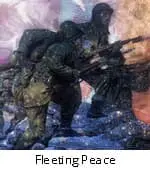
Fleeting Peace
The soldiers hear the roar of rattling guns,
But they cannot avoid the raging war.
The war has given Death a throng of sons;
He brings them to the grave and shuts the door.
The stalwart men attempt to carry on
but meet with horrid shelling all around.
Then Death begins to walk from night to dawn
To gather all the trophies from the ground.
Few men of peace decry this bloody scene,
Intent on ending wars they all abhor.
But as they try to stop the war machine,
Voracious Death returns for even more.
From dawn to dusk, the sun observes the pain
Of earnest men who reach for peace in vain.
The inevitability of death is seen in the wars that have scourged mankind. With this sonnet, I reflect on the struggles of soldiers and the futility of peace efforts in the face of the relentless violence that accompanies wars and the emotional toll it takes on individuals and society.
Image by Activedia via Pixabay
Poetic form: Sonnet
© 2019, Angel L. Villanueva. All rights reserved.
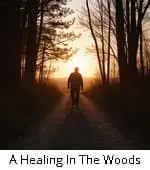
A Healing In The Woods
I pause, dismayed by thoughts from long ago,
When I was young and lost along the road.
They stir inside my mind and bring me low,
Replaying times of grief and debts I owed.
A final act is played as evening falls
And memories I've passed begin to fade.
I hear a voice announcing urgent calls
To leave behind the debts already paid.
Above, I hear the songs of joyous birds,
Reminding me of days I should let go.
Their lovely ballads are like soothing words
That mend and heal while setting hearts aglow.
These woods applaud my walk of beaming cheer,
For I, at last, have shed my days of fear.
Image by ALV - AI generated
Poetic form: Sonnet
© 2019, Angel L. Villanueva. All rights reserved.
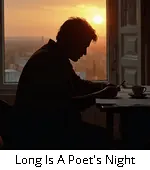
Long Is A Poet's Night
Return, my muse, my words give back,
For night has yet to settle down.
As sundown dims to shades of black,
My thoughts in fading ink now drown.
My fleeting words are barely there—
Unnoticed lines that crave the light.
So please, my friend, see my despair
And grant me verses I can write.
This darkness hides the world outside;
It veils my eyes, so I can't see.
Rich colors daylight had supplied,
But now my words cannot pour free.
Beside the window, dressed in black,
I sit and frown, for night has won.
My coffee cools, my pen holds back;
My muse has left me, like the sun.
There are times when writers encounter creative roadblocks, unable to come up with the words needed to share an idea or express their emotions. I wrote this poem after experiencing one of those periods.
Muse = Inspiration
Image by ALV - AI generated
Poetic form: Quatrain
© 2018, Angel L. Villanueva. All rights reserved.

Pawn
O haughty king, you step on stately ground;
Your peerless army sneers while standing by.
Your rooks advance to where my pawns are found,
And both your knights attack where bishops die.
The battle rages on as lines advance;
I hear the snorts of horses close to me.
The end seems near, despite my stalwart stance,
When suddenly, in fear, you start to flee.
My forces reach your fortress yet again;
The battle is intense beside your queen.
Surrounded, you surrender to my men,
For they achieved a blow you had not seen.
Your haughty laugh has ended at his hand;
A lowly pawn defeats you where you stand.
I had been an avid chess player in my younger years, but I've since given up playing the game. Recalling some of those early days inspired me to write this poem.
Image by Pixabay
Poetic form: Sonnet
© 2018, Angel L. Villanueva. All rights reserved.
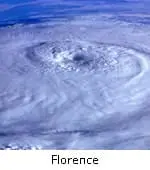
Florence
From far away, her journey starts;
Her strident shrieks to heaven climb.
The ocean feeds her rising rage,
And no one can predict her time.
Across the vast expanse she goes,
Her windswept hair of clouds her crown.
Along her path are cries of woe
As islands soak her tears and drown.
She reaches land in darkened skies,
And all the trees convulse with fear.
Undressed and scarred when she arrives,
They start to groan, for death is near.
I wrote this poem after seeing much news footage of the devastation caused by Hurricane Florence, which struck the coast of North Carolina in 2018. Although it had weakened to a category 1 hurricane by the time it made landfall, it still resulted in catastrophic flooding and wind damage across a wide area of the North Carolina coast.
Image by Pixabay
Poetic form: Quatrain
© 2018, Angel L. Villanueva. All rights reserved.

Blue Marble
I marvel at your dances with the sun;
Your spin is swift yet balanced in the void.
The stars arise and then unite as one
To cheer the peerless dance that they've enjoyed.
Your siblings envy your cerulean gown;
Its bluish blush is seen beyond the sky.
Majestic is the shawl, as soft as down,
That drapes the firmament where men can fly.
The orange flush of falling dusk reveals
A sampling of the hues that dye your gown.
There's amber, gold, and scarlet, which appeals
To all who see the splendor of your crown.
O charming lady, dance until the dawn,
Then dance again as all the stars look on.
Image by Pixabay
Poetic form: Sonnet
© 2018, Angel L. Villanueva. All rights reserved.
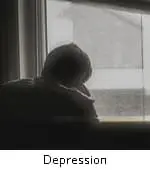
Depression
I am the one who haunts your dreams
And drowns your tears with drenching sweat.
I see the pain and silent screams
Of bygone years you can't forget.
I am the ache behind the mask—
What others fail to see in you.
I am the grief beneath your casque—
The smile you wear to hide your blue.
I am the scar that sears your heart,
The plaintive voice you hear at night.
I hide the life you want to start
And only show you scenes of blight.
I am the darkness in your soul,
The one who hears your sobbing cries.
I'm not your friend; I have one goal:
To keep the dimness in your eyes.
Depression, personified in this poem, is a plague on the mind. It haunts the sufferer with emotional pain, grief, and despair. At the same time, the individual struggles to conceal his or her true feelings behind a facade. That is the essence I wanted to capture with this poem.
Image by Andrik Langfield via Unsplash
Poetic form: Quatrain
© 2018, Angel L. Villanueva. All rights reserved.
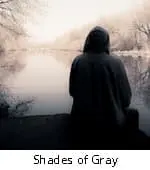
Shades of Gray
In darkness, I have walked alone,
Where there's no ear to hear me groan.
I search for hope on weakened legs—
A friend who'll lift my arms of stone.
My eyes are drawn to shades of gray,
Not crimson lips with which to play.
Beyond the rain and somber clouds,
I see no blue, just walls of clay.
I fret about the years gone by,
And then my heart begins to cry.
This lightless cell has kept me blind;
Its hold on me I will defy.
Although I'm weak, I rise to fight
Against the angst that comes at night.
I long to see the smile of dawn
As she awakens, adorned in white.
Dejection can bring on feelings of isolation and a yearning for hope in a brighter future. In this poem, I explore the themes of loneliness and despair, centering on a person who has not surrendered and continues to battle his depression, which resembles a prison-like cell. He yearns for the comforting presence of a friend and the uplifting glow of a new dawn.
Image by Pixabay
Poetic form: Quatrain - Rubaiyat
© 2018, Angel L. Villanueva. All rights reserved.
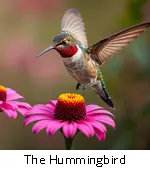
The Hummingbird
I opened my eyes,
And there she was,
The hummingbird.
Strange, how fragile she seems,
Yet so powerful in flight.
I gaze, amazed, as she hovers
While searching for a flower.
Selectively,
Carefully,
She searches.
What a beautiful creature!
I smile and close my eyes;
No creature compares to her,
The hummingbird.
Image by ALV - AI generated
Poetic form: Free Verse
© 2017, Angel L. Villanueva. All rights reserved.

